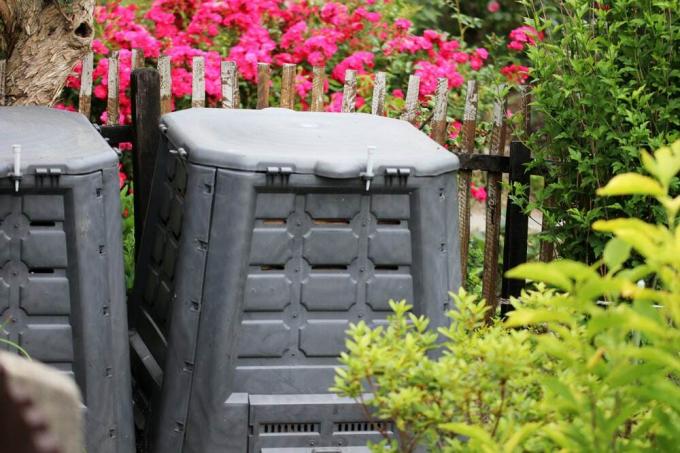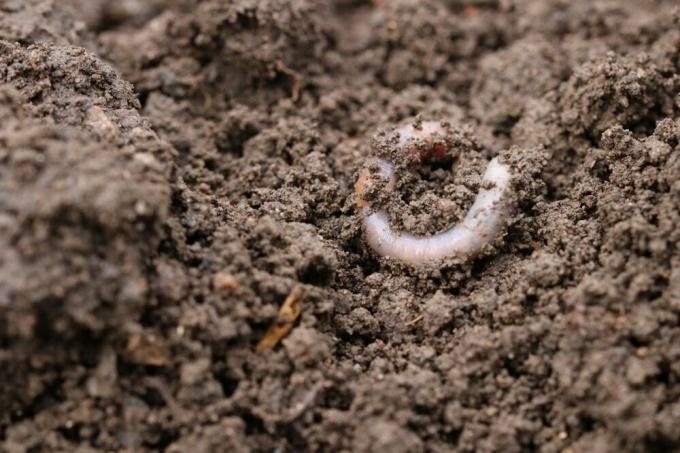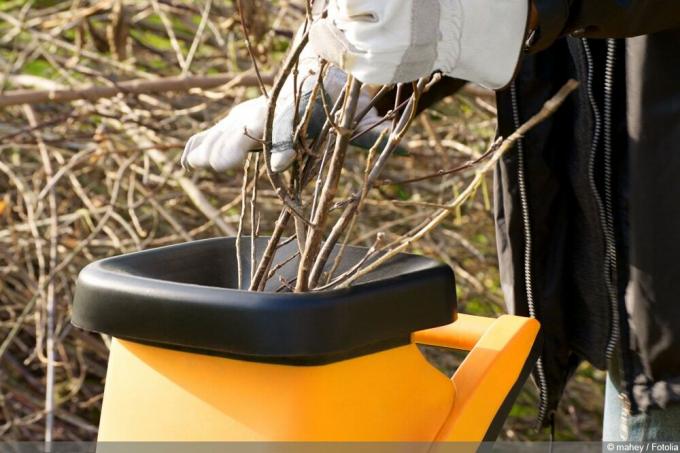

Table of contents
- How compost accelerators work
- Commercial powders
- Inoculate with compost
- yeast solution
- worm castings
- vegetable manure
- Effective Microorganisms
- EM in the Bokashi bucket
A well-mixed compost with solids of different sizes requires little attention and maintenance. When the organic waste piles up on the bin, it's time to act. There are many ways in which you can positively support the rotting processes in the compost. Products from the garden market promise many advantages, but cause undesirable side effects. Compost accelerators made with home remedies are a natural and effective solution.
How compost accelerators work
Numerous microorganisms in the compost ensure that animal and plant remains are decomposed. They excrete the nutrients contained in them and make them available for the plants. A compost works with a humidity of 80 percent and temperatures of at least 15 degrees Celsius. Nitrogen and carbon provide the necessary energy for the metabolism of the microorganisms to function, but the conditions in the compost are not always optimal for the living beings. Compost accelerators improve the conditions for the rotting processes. They increase the temperature inside and provide soil organisms with additional nutrients.
A notice:
Did you know that sugar or molasses promote hot rotting? This creates temperatures between 60 and 70 degrees Celsius, so that unwanted weed seeds are killed.
Commercial powders
In the garden market you will find a wide selection of compost accelerators with different compositions. The powdered preparations mainly contain nitrogen, phosphorus and potassium. Therefore, these accelerators are called NPK. Horn or bone meal is often used as a source of nitrogen. They are rich in enzymes and trace elements that come from stone and algae flour. At the same time, these additives ensure that unpleasant odors are suppressed. Despite the promising advantages, these mixtures come with some disadvantages:
- expensive to buy
- Macroorganisms such as worms, isopods and centipedes do not like the additives
- animal ingredients may attract black flies
Inoculate with compost

To give freshly made compost a jump start, you can mix a few shovelfuls of mature compost into the organic waste. The finished fertilizer contains numerous microorganisms and bacteria, so you can inoculate the newly made compost. To further speed up the rotting process, you should water the compost regularly. Be careful not to overwater the substrate. In order for the organisms to be able to work optimally, the compost must be sufficiently aerated. However, this variant has some disadvantages:
- Compost needs to be rearranged to allow microorganisms to disperse
- only useful in warm temperatures
- Weed seeds and fungal spores can transfer from the old to the new compost batch
yeast solution
If your compost is too full, you can make your own compost accelerator using ingredients from the kitchen. Crumble a fresh cube of yeast in a pot of lukewarm water and dissolve about 500 to 1000 grams of sugar in it. Let the brew steep for about two hours and then pour it into a watering can. Fill the pitcher with water to dilute the solution. Poured over the compost, you can see the positive effects of the compost accelerator within a few days:
- Yeast multiplies rapidly increases the temperature
- Heat accelerates decomposition
- Water and sugar support the activity of the microorganisms
- Compost collapses after a few days
- also usable in winter
Tip:
Did you know that you can grow your own yeast with ripe apples or unsulphured dates? The pieces of fruit are simply filled with water and sugar in a screw-top glass and placed in a warm place until bubbles form.
worm castings
With one liter of warm water, 250 milliliters of molasses and 200 grams of worm castings, you can create a natural compost accelerator that also acts as a soil conditioner. Worm castings are also known as worm castings and are commonly used as organic fertilizers. The substrate is enriched with countless bacteria and microorganisms. This special soil has positive effects in the compost, because the creatures attract earthworms and thus support the decomposition processes of organic material. Plants that you fertilize with the mature compost benefit from numerous advantages:
- improved root growth
- increased water storage capacity in the substrate
- better storage capacity of the soil for nutrients
- Pollutants in the soil are bound
vegetable manure

Plant brews not only serve as a strengthening agent for vegetable plants, but can also accelerate the rotting processes in the compost. For the production you can use fern fronds, nettle leaves, valerian or comfrey. Gather about a kilogram of fresh leaves and pour lukewarm water over them. Rainwater is ideally suited for the preparation of a liquid manure. There are numerous bacteria and yeast fungi on the leaves. Placed in a warm place, the brew ferments as the microorganisms multiply and produce gases. Stir the batch daily. The brew is ready to use after about three weeks. It is diluted with water in a ratio of 1:10 and poured over the compost. You do not have to filter out parts of the plant, as these will decompose on the compost.
Tip:
Sprinkle a handful of rock flour into the brew. The flour binds unpleasant odors and ensures that the odor nuisance is not too strong.
Effective Microorganisms
Mixtures that you can purchase in any garden store are hidden behind this term. They consist of various microorganisms from the food industry. Among them are bacteria that are viable with or without oxygen. This makes effective microorganisms, EM for short, a perfect compost accelerator. Mix about a liter of the liquid solution with EM to about ten liters of water. This amount is enough to inoculate one cubic meter of compost.
- less odor nuisance
- annoying fruit flies disappear
- Organic waste is decomposed into fresh soil in six to eight weeks
- can be used at any time in warm temperatures
EM in the Bokashi bucket
Despite the advantages, there is a disadvantage that can occur when using effective microorganisms. Living beings can only live if the environmental conditions are right. If the temperatures drop below ten degrees Celsius, the microorganisms die. But even in winter you can take advantage of effective microorganisms by throwing your biological kitchen waste in an airtight plastic bucket. These are pounded and sprayed with EM. Under anaerobic conditions, the waste ferments. It is important that the resulting juice is drained after a week at the latest. Otherwise, undesired putrefaction processes occur and the mass gives off unpleasant odors. There are special Bokashi buckets that seal airtight and have a tap for easy drainage. This miniature quick composter has many advantages:
- fermented substrate can be used after two weeks
- drained liquid serves as a valuable liquid fertilizer
- Vessel saves space
- Can be used in the kitchen
- no unpleasant smells
 Home editorial office
Home editorial office
Learn more about making compost

Dampen the earth properly: build your own earth damper | sterilize compost
Sterilizing soil is a common practice that more and more home gardeners are embracing. This allows soil and especially compost to gain optimal quality. The gardening expert explains how to do it correctly and how easy it is to build an earth damper yourself.

Build your own worm box: Instructions | DIY worm composter
Building a worm box yourself is quite easy, but has numerous advantages. In our instructions we show how the DIY worm composter can be made with simple means and in just a few steps.

Build your own composter 12 tips for rain barrels, pallets & garbage cans
A composter is ideal for the garden and balcony. But the numerous options represent a hurdle. Each variant has its advantages. But no matter whether you build your own composter or buy it: there are some aspects that you should consider.

Balcony worm composter: Create compost on the balcony
Gardening is now done in the smallest of spaces, so growing vegetables on the balcony is no longer out of the question. However, a prerequisite for a good harvest is high-quality soil, which can be produced even in a limited space using vermicompost.

Shredding garden waste and hedge trimmings: which shredder is suitable?
Gardening results in branch cuttings and green waste that can either be disposed of or reused. With a garden shredder, the greens can be processed into compost or mulch and made available for garden use. There are various variants to choose from, which can be adapted to the intended use.

Build a pass-through sieve yourself | Mesh size for compost, soil and sand
In a well-equipped home garden, a pass-through sieve removes unwanted components from compost, soil and sand. With a little manual skill and these instructions, you can easily build a stable garden sieve yourself. You can find out here which mesh size guarantees perfect results.



